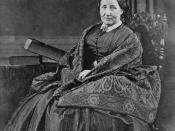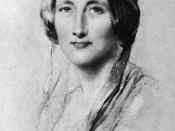Mary Barton is a novel written by Elizabeth Gaskell set in Manchester, England in the 1830's. It follows the story of a working-class family suffering the harsh conditions of factory labour. Gaskell worked in Manchester helping the poor during the height of social problems in the area. This makes the novel a primary source as she describes conditions in a purposely accurate way, her intention being to inform the ignorant middle and upper classes of the grave hardships felt by working class people.
The text goes in to a lot of specific detail on the domiciles of the characters and also their sicknesses and sufferings. Gaskell describes the feelings of the poor towards the upper classes: "We're their slaves as long as we can work; we pile up their fortunes with the sweat of our brows, and yet we are to live as separate as if we were in two worlds..."?
This is an accurate summation of views of the time. Workers felt a great resentment to the rich because of the disproportionate work to wealth ratio - it seemed the more physical labour undertaken, the smaller the wage.
The text is useful for the discussions 'living and working conditions for working-class people' and 'economic and social divisions between rich and poor'. In regards to the social divisions, the text provides a view from both perspectives as there is a character from the upper classes who falls in love with a poor dressmaker. The rich man, named Carson, is completely ignorant to the sufferings of the girl he loves and her father. This is reflective of the times in that many of the rich in factory districts like Manchester and most of the middle class in the rest of England thought 'out of sight out of mind'. They did...


